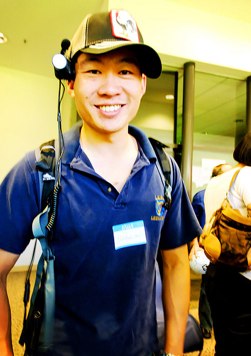Editor’s note: This guest post is by Justin Kan, cofounder of Justin.tv and TwitchTV. You can follow him on Twitter here and read his blog here.
Behavior is a virus. We spread our behavior to those around us, whether passively or on purpose.
Pop quiz: what factor most highly correlates with obesity? It isn’t income, race, religion, or genetics. It turns out that the best indicator of obesity is your friend group: if you have overweight friends, you are more likely to be overweight yourself. This makes sense, because you develop your behavior set from interactions with those around you. If your friends are physically active and eat well, you’ll have more opportunities to be physically active yourself, and spend more time over healthy meals. Alternatively, if your friends are living a real-life version of Super Size Me, you’re likely on the express train to type II diabetes.
Given enough exposure to a behavior, that behavior will become normative. This is true for both positive and negative behaviors. One simple behavior I’ve seen spread through my own friend group is riding motorcycles. I first started riding a few years ago after two of my friends came by on their bikes (having wanted to start for years, but never having a catalyst until that moment). Fast forward four years and both my brothers, two roommates and many other friends are riding, with many more in various stages of taking the rider’s test and joining the organ donor’s club.
Over the past several years I’ve been surprised to learn that this is also the case for entrepreneurship. For most people, startups are a risky endeavor and something to be avoided. Many are hesitant to quit their secure jobs and try to start a company from scratch. From an expected value perspective, when factoring in some risk adversity attributable to basic human nature, they are correctly maximizing outcomes. However, for a growing group, I’ve noticed that startups are a normalized behavior, and that this generally spreads through personal connections.
My brother Daniel is the perfect example of this. When Daniel graduated from college in 2009, the economy was in a horrible recession, and it was extremely difficult for new grads to find jobs. Initially having very little interest in startups, he started doing sales and business development at Uservoice after finding no options in consulting and banking, where the few friends of his fortunate enough to find work were headed. After a couple years of being friends with founders and early employees of startups, hearing about startups everyday and rooming with startup founders, he made the jump himself and recruited a team to launch Appetizely.
An example of culture-hacking at scale is Y Combinator. One of the reasons I think Y Combinator is so powerful is because it creates a new social norm, especially for those who come from outside Silicon Valley. When you start at YC, your friends and family think you’re crazy. By the end, you have another friend cohort: other YC entrepreneurs and alumni. These new friends will provide support and advice, but the most important thing that they give you is implicit assurance that you are not crazy.
The lesson here is that through some clever social engineering you can hack your own life to put yourself in the position to accomplish goals you don’t even know how to begin. This is also also how ZeroCater started. Over three years ago I was interviewing candidates for a community manager postition at Justin.tv. One interviewee particularly stood out. Arram didn’t have any experience or really any qualifications; in fact, at the time he had been working as a security guard and had never been to college. But, unlike most of the other candidates, he had thought extensively about what he would do as the community manager and had written down his many ideas in preparation for our interview. He was also passionate about creating his own startup eventually, and his excitement was inspiring. We ended up hiring someone else who had more community management experience for the job, but I was so impressed with Arram’s preparation that we hired him anyways to do random office projects.
One of Arram’s minor responsibilities ended up being ordering meals for the company. It ended up being such a time saver for the team that one evening I suggested that he offer ordering as a service to a few other YC startups in the neighborhood. That was the last I thought about it, but a month later I was shocked when Arram came back to me and told me he was quitting to grow it as a startup. Two years later, and he’s recruited a technical team, built out software to manage the entire workflow and serve companies like MTV, CBS and Verizon.
Arram didn’t have the programming or product background that you would expect from someone who would later go on to raise over $1 million in venture capital for a technology startup. He got in the game by doing whatever it took to get into a startup and surrounded himself with startups, making it impossible for him to not think about startups. Just being in the community creates opportunities: how else would you come up with the idea for a food subscription service that solves a very specific company problem?
You can hack your own culture. Surround yourself with people who do what you want to do, and eventually you’ll wake up to find yourself doing the same.
